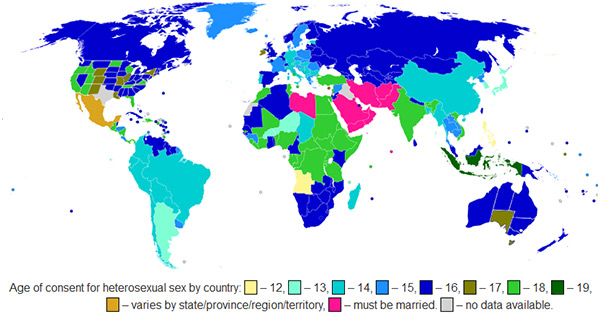Summary | Excerpt | Reading Guide | Discuss | Reviews | Beyond the Book | Read-Alikes | Genres & Themes | Author Bio

A Novel
by Bryn GreenwoodThis article relates to All the Ugly and Wonderful Things
The age of consent, according to western law, is the age at which a person is capable of agreeing to engagement in sexual activity. Stephen Robertson, in his article "Age of Consent Laws", states: "Narrowly concerned with sexual violence, and with girls, originally, since the 19th century the age of consent has occupied a central place in debates over the nature of childhood, adolescence, and adulthood, and been drawn into campaigns against prostitution and child marriage, struggles to achieve gender and sexual equality, and the response to teenage pregnancy."
According to Robertson, the first age of consent statute appeared in 1275 in England, and was part of a rape law. Called Westminster 1, the statute declared "ravish[ing] a maiden within age" a misdemeanor, whether she consented or not. Within age referred to the legal age of marriage, which, at the time, was twelve years old. In 1576, it became a felony to engage in sexual activity with a girl under the age of ten, thus drawing a distinction between the maturity of a ten year old and a twelve year old. The girl did not need to prove that she struggled in order for the perpetrator to be found guilty, seemingly indicating an awareness of a power dynamic at play; however, the law did not apply to married women (who could be as young as 12 years) on the one hand, nor did it acknowledge the possibility of consent on the part of the girl on the other.
At the end of the 18th century, as part of the Age of Enlightenment, the development of children became a focus, and so their distinction from adults became more solid and defined. As a result of this the age of consent came under scrutiny in many parts of Europe. In France, for example, the age of consent was increased to thirteen years old in 1863. It also now included boys. In the U.S. at this time, the laws only applied to girls, and each state determined its own laws, which stayed lower than some in Europe – ranging from ten to twelve years old.
The age of consent has shifted and evolved over time, but one consistency has been its inconsistency. Different countries and different eras have continued to adopt different standards and laws, and have engaged in different kinds of debate.

Today, many countries in Europe have their age of consent set at sixteen. Included here are Britain Cyprus, Finland, Georgia, Spain, Latvia, Lithuania, Luxembourg, the Netherlands, Norway, and Switzerland. In France, the Czech Republic, Denmark, and Greece, the age is fifteen. In Austria, Germany, Portugal and Italy the age is even lower: fourteen. In Asia, the age of consent in China is fourteen, and in Japan it is thirteen. In South America, Brazil, Peru, Paraguay, Ecuador and Colombia all have the age set at fourteen. In some countries, the age of consent is tied into marriage laws. For instance, in Saudi Arabia, sexual activity outside of marriage is illegal, but marriage is legal at any age. In the U.S. the age of consent still ranges by state. Today that range is between sixteen and eighteen years of age.
Age and gender of the minor are not the only ways consent laws can differ from one another; heterosexual and homosexual consent laws can vary too. The Bahamas, Bermuda, Chile and Paraguay have a higher age of consent for homosexual activity. And some countries have different consent laws based on gender. In Papua New Guinea the age of consent is fourteen for boys and sixteen for girls, while in Indonesia it is sixteen for girls, but older for boys who must be nineteen.
Yet more inconsistencies arise in specific case categories, such as when someone is in a position of power or trust over another person – like in a relationship between a teacher and a student. In England, the age of consent is sixteen, but if the person is a student of the other, then the legal age jumps up to eighteen.
Filed under Society and Politics
![]() This "beyond the book article" relates to All the Ugly and Wonderful Things. It originally ran in August 2016 and has been updated for the
October 2017 paperback edition.
Go to magazine.
This "beyond the book article" relates to All the Ugly and Wonderful Things. It originally ran in August 2016 and has been updated for the
October 2017 paperback edition.
Go to magazine.
Your guide toexceptional books
BookBrowse seeks out and recommends the best in contemporary fiction and nonfiction—books that not only engage and entertain but also deepen our understanding of ourselves and the world around us.